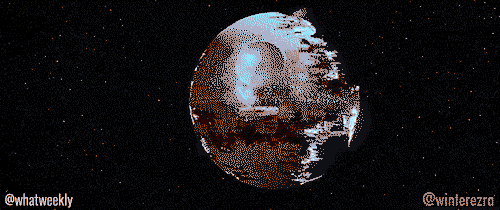From the ICR’s URCall series of videos, hosted by Markus Lloyd. “Where did the first atom come from?” (link)
Transcript:
How did the first atom in the universe appear? The big bang attempts to explain that the Earth sprang into existence from a quantum-mechanical fluctuation, or even out of nothing. But it does not adhere to the law of cause and effect. If it’s impossible for something to come from nothing, then what is that something, or someone, that created the universe? Christians know the answer.
In terms of audio, there’s a weird tonal change in the middle there, from “But it…” to “…the universe.” I suspect that this section was just cribbed straight from Unlocking the Mysteries of Genesis to save time, but it sticks out like a sore thumb in this video. As for the visuals the animation used to represent the big bang is gloriously inaccurate in pretty much every way you look at it. The presence of background stars – at least in later frames – suggests it would be better employed as a supernova, and in geometry it also reminds me of a certain scene from Star Wars:

Faith is knowing that the universe was created when the Death Star II exploded at the end of Return of the Jedi. (Source)
Going from finish to start, this is obviously the “first cause” argument. What I don’t like about that one, at least as presented in a simplistic way like this, is how we immediately jump from “there must be some kind of extra-physical first cause” to “it must have been a god, specificity mine.” My favourite alternative process – given that we have apparently opened up the floor to any possibility imaginable – is that the universe was in fact created by us, some time in the future, the first time somebody successfully creates a pocket universe-in-a-jar. The argument is worse, however, when used by young-Earth creationists as instead of simply inserting their god at the bottom of the causal chain they replace the chronology of events completely. This is hardly the only common apologetic that shouldn’t be used by YECs.
Thirdly, the ICR brings up quantum fluctuations, one origin for the big bang that has been proposed. But quantum fluctuations do happen, and apparently without respecting cause and effect. Whether or not they are the true origin of the universe they do present a few problems for the “law” upon which this whole argument is based, don’t they?
Secondly, when they say “The big bang attempts to explain” the words “attempts to explain” are most important – clearly they didn’t let whoever it was do the explaining finish if they really think that the big bang directly produced the Earth. More likely though they don’t want explaining the details to get in the way of promoting nonsense.
Firstly, though, the title question is terrible. Atoms – plural – arrive pretty late in the chronology of the big bang, as things have to cool down quite a lot first. The young-Earth creationists for their part contend that all the atoms in the Earth, at least, were created at once in a single action, although one of their wackier ideas hold that Earth and other bodies were first created from water molecules and then transformed to other elements in order to create planetary magnetic fields. They could really have thought of a better way of phrasing that – they skimped on everything else.

Lloyd is right that Christians have an answer, but so do Muslims, Hindus, Sikhs, deists, etc. Perhaps he would say his goal is to get viewers to think; however, what he seems to most often do is encourage shallow and illogical thinking. He often fosters conclusions that, even if potentially true, do not logically follow from his premises or supposed facts. Perhaps this is the real goal of this URCall series–to discourage critical thinking, especially in young people. But as noted before, this strategy is likely to backfire, as they become more educated, learn to reason better, and start to examine YEC claims in more depth.